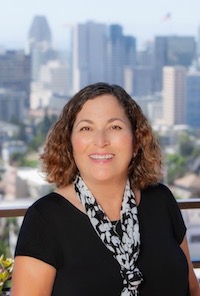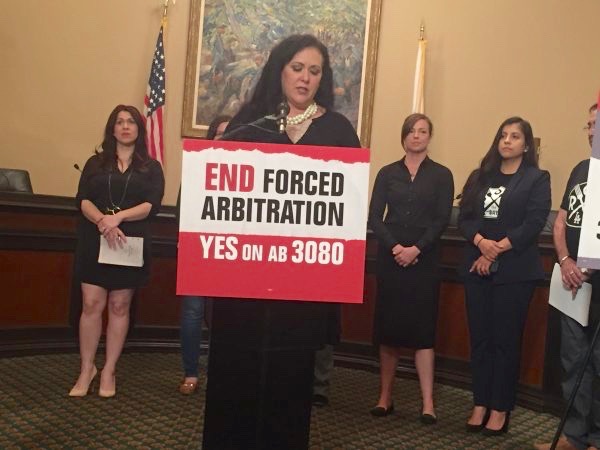Daily Business Report-Oct. 4, 2018
Paseo Del Mar office property. (Photo courtesy of Irving Company)
Irvine Company Acquires Paseo Del Mar,
its fourth office acquisition in the past year
Irvine Company has acquired Paseo Del Mar, a 235,000-square-foot Class A office project located in Del Mar Heights. This is the company’s fourth significant San Diego office property purchase in the past 12 months. The seller is Union Investment, advised by Metzler Real Estate. The sales price was not disclosed.
Completed in 2006, Paseo Del Mar’s three, three-story buildings feature premium campus office architecture and an abundance of onsite amenities that provide workday conveniences to enhance workforce productivity. Amenities include a café, Wi-Fi enabled courtyard, subterranean reserved parking, electric vehicle charging stations, fitness center with full-service locker rooms and several walking trails.
Paseo Del Mar is leased to a diverse group of companies, including Sheppard Mullin, Pillsbury Winthrop, Dowling & Yahnke Wealth Management, Bank of Southern California, Kilpatrick Townsend, and Compass.
Paseo Del Mar is located at 12255, 12265 and 12275 El Camino Road.
Last week, the company announced the purchase of La Jolla Reserve in La Jolla UTC. In January, Irvine Company purchased Gateway at Torrey Hills. In September 2017, the company acquired nearby Township 14. In total, the company has added nearly 1 million square feet to its San Diego office portfolio in the past year.
Eastdil Secured handled negotiations on behalf of the sellers.
__________________

General Atomics evaluates arresting
gear performance on turboprop aircraft
General Atomics’ electromagnetic systems business has completed an assessment of its Advanced Arresting Gear’s performance on turboprop aircraft at Joint Base McGuire-Dix-Lakehurst in New Jersey. The testing was completed for the C-2A Greyhound, E-2C+ Hawkeye, and E-2D Advanced Hawkeye aircraft.
The testing supports the Navy’s development of a propeller Aircraft Recovery Bulletin, which is a prerequisite for arresting propeller aircraft aboard USS Gerald R. Ford.
“The Advanced Arresting Gear (AAG) system is designed to arrest a broader range of aircraft and provide higher reliability and safety margins for the U.S. Navy’s Ford-class of aircraft carriers,” said Rolf Ziesing, vice president of Programs at General Atomics Electromagnetic Systems. “As each aircraft is brought in for testing, AAG continues to perform reliably, arrestment after arrestment.”
The AAG system has been exercised extensively, with more than 800 total roll-in and fly-in aircraft arrestments successfully performed.
__________________
Scripps Research division find potential
therapies against fatal diseases
Each year, millions of people worldwide suffer from potentially fatal infectious diseases that often leave survivors facing a lifetime of related health problems. But what if drugs against such diseases already existed but nobody knew it? Scientists at Calibr, a nonprofit drug discovery division of Scripps Research, are now exploring that question using an extensive library they’ve built of nearly all existing small-molecule drugs shown to be appropriate for direct use in humans.
The Calibr scientists are using this collection, called ReFRAME, to identify existing drugs that show promise for treating major diseases. As a result of this ReFRAME initiative, two FDA-approved drugs are already being tested in clinical trials—one as a treatment for tuberculosis and another for the parasite Cryptosporidium spp., a major cause of severe diarrhea—within only a few short years of Calibr scientists discovering their utility. This is in contrast to the much longer timelines that often hinder new drug development.
__________________

Former U.S. Ambassador
to speak at San Diego State
Johnny Young, former U.S. Ambassador to Sierra Leone, Togo, Bahrain and Slovenia, will speak at San Diego State University on Monday, presenting his lecture: “Refugee Resettlement: How did we get here and how do we move on?” SDSU President Adela de la Torre and Lance Nail, the Thomas and Evelyn Page Dean of the Fowler College of Business, have invited the campus community to attend the event, part of the Charles W. Hostler Institute on World Affairs and President’s Lecture Series.
The event will be held from 2-3:30 p.m. in the Conrad Prebys Aztec Student Union’s Montezuma Hall. The event is free and open to the public, but registration is requested (click here).
A light reception will follow Young’s lecture.
Young will explore how with leadership, vision and will, the refugee situation can be improved and how the United States can regain its leadership in this vital humanitarian work.
Prior to retirement, Young served from August 2007 to February 2015, as executive director of Migration and Refugee Services of the U.S. Conference of Catholic Bishops and, for a period, also worked as a consultant, contractor and lecturer.
__________________
Viasat to supply in-flight Wi-Fi
to new Aeromexico aircraft
Satellite Internet provider Viasat has inked a deal to supply high-speed, in-flight Wi-Fi to 18 new Boeing 737 Max jets ordered by Aeromexico.
Antennas and other equipment for Viasat’s Wi-Fi service are being installed now on Boeing’s factory floor, the Carlsbad company said last week. Aeromexico has an option to include Viasat’s broadband technology on another 60 new aircraft orders in the future. The deal comes after Viasat launched its second Internet satellite in mid-2017, which expanded its coverage footprint to include all of Mexico, as well as Central America and parts of South America.
__________________
Personnel Announcements
Jesse Mellon and Sarah Bowles join Nuffer, Smith, Tucker


Nuffer, Smith, Tucker announces the addition of two new hires with diverse professional backgrounds to the full-service agency — Jesse Mellon and Sarah Bowles.
Jesse Mellon joins NST as creative manager with extensive experience in branding and identity, responsive website design and multi-touchpoint campaign materials – running the gamut from advertisements, tradeshow booths and banners, brochures, social media ads and more. During his 18 years of experience in graphic design, Mellon oversaw art direction and strategy for several biotech, entertainment and big data companies. He holds a bachelor’s degree in graphic design from The Art Institute of Pittsburgh.
Sarah Bowles joins the team as an account executive, bringing more than four years of communications experience to her role, including media relations, social media strategy and management, event coordination, influencer outreach, and blog and messaging development. Bowles will work with a variety of NST clients, including the Citrus Pest and Disease Prevention Program and Shift San Diego. Bowles holds a bachelor’s degree in broadcast journalism and a minor in political science from the University of Colorado at Boulder.
__________________

Tom van Betten joins Matter Real Estate Group
Matter Real Estate Group, a San Diego-based real estate development company, has hired Tom van Betten as vice president of development. A highly regarded commercial real estate professional with over 25 years of experience in the industry, van Betten has a deep understanding of every aspect of the business, having worked as a commercial broker, representing tenants, landlords and developers in complex leasing, sales and investment negotiations.
Van Betten brings a valuable, complementary skill set to the company. As a former top broker, he has guided some of North America’s leading companies – including Qualcomm, Viasat and Mission Federal Credit Union – into new facilities.
Prior to joining Matter, van Betten was the executive director of tenant representation at Cushman & Wakefield, where he worked for the past 12 years. There, he focused on lease renewals, relocations, building purchases and headquarters transactions, taking into consideration the importance of workplace environment on company culture. During his time at the company, van Betten received numerous awards and accolades and was continually a top 10 producer.
Before that, Betten held roles as the vice president/ONCOR manager for Burnham Real Estate and as senior vice president for Colliers International, Las Vegas. During that time, he represented high-profile building owners in both leasing and investment sales.
__________________
Shari Friedman Schenk named president
of JNF San Diego Board of Directors

Shari Friedman Schenk, director of business development at San Diego plaintiff’s law firm CaseyGerry, has been named president of the Jewish National Fund (JNF) San Diego Board of Directors for a two-year term. In this position, her goals are to increase the visibility of JNF in the community as well as expand the “Plant Your Way to Israel” program (which encourages anyone under 30 to save for a trip to Israel) and to develop the “JNFuture” program for young San Diego professionals.
Active in the community, she is past board chair at the San Diego Jewish Academy and a former president of the Agency for Jewish Education. She was a board member of the United Jewish Federation’s Women’s Division for nearly ten years and also served on the boards of the Lawrence Family Jewish Community Center, the Center for Jewish Culture and Hillel of San Diego.
Schenk is a graduate of the Wexner Heritage Foundation program for leadership development and was appointed by former Gov. Gray Davis to serve on the California Commission for Economic Development.
_____________________________________________________________________________

Jerry Brown paddles to the left,
paddles to the right on #MeToo laws
By Laurel Rosenhall | CALmatters
Patricia Brooks said it was sexual harassment when she was taking a call as a 911 dispatcher in San Mateo and a colleague reached his hand inside her bra and fondled her breast. The courts disagreed in 2000, saying it wasn’t sexual harassment because the single incident didn’t amount to a “severe or pervasive” problem—the legal standard necessary in a civil suit.
That decision led to a long-standing legal interpretation that critics say has allowed harassers “one free grope.” But not anymore.
A bill Gov. Jerry Brown signed over the weekend rejects that interpretation, clarifying that a single incident of harassment can be enough to meet the legal standard. In other words, starting Jan. 1, California law essentially says: “Actually, no free gropes.”
It’s one of the more tangible changes Californians can expect from a suite of bills Brown signed that were inspired by the #MeToo movement, which erupted last year after the New York Times exposed abuse by film producer Harvey Weinstein in coverage that eventually grew into global demands for change. In California, lawmakers introduced more than two dozen bills to combat workplace misconduct and hold offenders accountable.
Brown finished acting on them Sunday, the constitutional deadline for him to sign or veto bills for the year and the final opportunity for him to make laws as he nears the end of his historic four terms as governor. Brown’s decisions on the #MeToo bills reveal his penchant for, as he once famously described it, paddling a little on the left and a little on the right.
He sided with victims’ advocates in some cases, signing bills that put California at the forefront of clamping down on harassment. In other cases he sided with employers, vetoing bills they said were too onerous.
“While there was definitely some great progress on the bills he did sign, we have a long way to go on preventing sexual harassment, especially on the particular challenges that low-wage workers face,” said Jessica Stender, a lawyer with Equal Rights Advocates, a sponsor of some of the bills, including the one providing guidance on the legal standard for harassment suits.

On the flip side, business interests concerned about litigation abuse said the lower standard will amount to a huge expansion of liability for them.
“It is going to significantly increase litigation,” predicted Caitlin Colman, a lobbyist for the Civil Justice Association of California. “It does not apply to just sexual harassment, it applies to all harassment claims.”
Samantha Corbin, a lobbyist who wrote an open letter last year decrying a culture of harassment in California’s political scene that was signed by hundreds of women, said she was disappointed but not surprised by Brown’s vetoes. Her advocacy group, called We Said Enough, lobbied for 13 anti-harassment bills this year. The governor signed eight and vetoed five.
“This governor has always strived for balance, particularly when you’re looking at contentious issues in the national spotlight,” Corbin said. “It’s very rare for him to go all in on one side.”
Brown signed bills that will:
• Prohibit employers from requiring employees sign non-disparagement agreements.
• Prohibit secrecy clauses in settlements for sexual misconduct, unless the complainant wants one.
• Require employers with five or more employees to provide sexual harassment prevention training to both supervisors and staff.
• Require California-based companies to add more women to their boards.
He vetoed bills that sought to:
• Require the state government to track harassment complaints and settlements in an annual public report.
• Get rid of arbitration clauses in employment agreements, making it easier for workers to sue rather than resolve conflicts in private arbitration.
• Require large businesses to keep harassment records for at least five years.
Extend the amount of time harassment victims have to file complaints, from one year to three years.
“Employees who have experienced harassment or discrimination in the workplace should have every opportunity to have their complaints investigated,” Brown wrote in his veto of Assembly Bill 1870 to extend the amount of time victims have to complain. “I believe, however, that the current filing deadline—which has been in place since 1963—not only encourages prompt resolution while memories and evidence are fresh, but also ensures that unwelcome behavior is promptly reported and halted.”
Some advocates complained that the bills Brown signed will largely help women working in professional settings, while those he vetoed were aimed at helping low-wage workers such as janitors, maids, waitresses and sales clerks.
“It seems the #MeToo protections won’t extend to women who don’t have a certain standing, access to attorneys or a level of existing power,” Democratic Assemblywoman Lorena Gonzalez Fletcher wrote on Facebook the night Brown vetoed several of her bills, including the one to ban mandatory arbitration, a practice more than half the nation’s nonunion private-sector workers are subject to.
“It’s pretty hard to celebrate the gains for women who have the same educational and access advantages as I do, while denying any gains for women like my mom and grandmother who never had those opportunities. You shouldn’t need a [T]witter account or an attorney to not be abused in your workplace. And some day, you won’t need either… we don’t give up that easy.”
Brown’s veto said her anti-arbitration bill violates federal law. The California Chamber of Commerce had deemed it a “job killer,” saying it could burden businesses with an avalanche of lawsuits. Arbitration agreements “expedite the resolution of claims in a less costly environment than sending all claims through an overburdened court system,” the Chamber said in a statement.
The fight is certain to continue next year, after Californians choose a new governor. And Gonzalez Fletcher may have a critical ally in her corner. One person who lobbied or her anti-arbitration bill this year was feminist filmmaker Jennifer Siebel Newsom. She, of course, is married to Lt. Gov. Gavin Newsom, the front-runner in the race for governor.
CALmatters.org is a nonprofit, nonpartisan media venture explaining California’s policies and politics.




